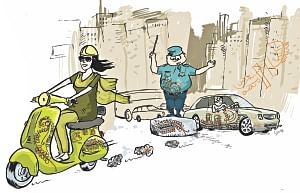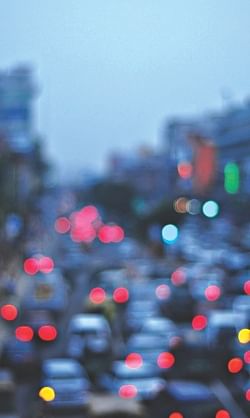Relative Paradise
| In Bangladesh, being a woman is difficult to say the least. Or is it? RS takes a look elsewhere around the world and finds out if our women are victors or, well...read on. |
 Once Once there was a country, and in this country, there lived a woman. She heard tell that the sun gave light. One afternoon, she stepped out of the house to see. An officer of the law, a virtuous man, looked upon her and was scandalised. Then he called to her, and when she came, he put shackles on her wrists.
Once Once there was a country, and in this country, there lived a woman. She heard tell that the sun gave light. One afternoon, she stepped out of the house to see. An officer of the law, a virtuous man, looked upon her and was scandalised. Then he called to her, and when she came, he put shackles on her wrists.
“Forty lashes,” he roared into surrounding ears, “And gold to be paid for indecency.” The woman's eyes were wide.
“Sir,” she cried. “Sir, I don't understand.”
“Trousers,” he bellowed back. “Your temptress legs call every man to sin.”
“Trousers, sir? But even you are wearing trousers.” The officer was, for a second, silenced. And then the answer came, and the answer explained it all.
“You are a woman.” And the woman was led away.
The wounds were healing on her back when the woman heard that grass was green. This time she donned a robe, down to her feet and loose around her waist. Her hair she wrapped in black. As she walked along the pavement, a different officer chanced to pass, and his gaze lingered on her face. She wondered if she was looking particularly beautiful that day, and as she wondered, he called to her.
“Your skin,” he said. “It is golden.” At her cheeks, the gold turned pink.
“Thank you, sir,” she replied, eyes cast down.
“Next time you are seen like this, you will be arrested.”
“Sir?” she exclaimed, incredulous.
“You look like a walking mannequin. You shame our society.”
“Sir, I don't understand.”
“You are a woman,” he replied, and then he walked away.
Frightened, the woman ran back home, and pinned a veil over her face. It flowed down over her eyes and nose and mouth. Outside again, she tripped her way into a crowd of men. Hands reached out and fingers pinched and grabbed and pulled. Terrified, the woman stood still and screamed.
“Why?”
The men looked at each other, and there was no guilt in their eyes.
“You are a woman,” they told her, “so we may.”
Time passed, and the woman was told the rain sounded like pattering feet. She took the keys from a bowl on the kitchen table, slid into the car, and drove off to find the rain. A mile later, a police car showed up in the wing mirror. She pulled over, the officers came, and they took her away. Ten lashes, the news read. Guilty of driving a car.
“Guilty?” asked the world. The world did not understand.
“She is a woman,” the authorities answered, and they knew they answered well.
These things have happened. Sudan: 43,000 women arrested in a single year, in their capital, for wearing trousers. Iran: The Chief of Police warned women that arrest was imminent if they were spotted with suntans. Egypt: 83% of 2020 Egyptian women said they had been sexually harassed. Half of these said they were harassed every day. Saudi Arabia: Woman found guilty of driving, sentenced to ten lashes.
And now, remember our own complaints. Think about the things we whine we have to tolerate, and watch it all pale to near invisibility.
Their eyes follow us everywhere. In jeans, they look at us as if we are naked. When we drive, they laugh. Pity curves their mouths into smiles when they hear our mothers have no sons.
But we are neither arrested, nor beaten. It's not supposed to be a victory, but perhaps it's a good start. We are legally entitled to every freedom available to a man. A girl may go to school with bare head and bare face, she may grow up and go to university; she may sit behind the wheel of a car and shout at every passing rickshaw. Our Prime Minister is a woman. The leader of our opposition party is a woman. They may not be setting sterling examples, but think back to when men were running the country. At least now we have a semblance of certainty, of knowledge. Whether we are going up or down is really up to us to decide.
In this country, girls may dream, and women, with some effort, may accomplish. Our sincere commiserations to the less fortunate.
By Safieh Kabir
Essence of Us
RS figures out what makes us Bangladeshi and what makes us change?
| |
 |
| |
Traffic lights are there just to make the streets look pretty,
PHOTO: SABHANAZ RASHID DIYA |
What is it that makes us Bangalis so… well, us? We pee in public, not to mention spitting and clearing our throats. We litter, we eve-tease. And we think that the traffic lights are there just to make the streets look pretty.
Old habits die hard, they say. But ever wonder why they die so easily once we get out of the country? Is it just the 'more civilised environment' abroad that turns us into model citizens, or is there more at work here? Once you are out of the country, you will see all the Mofizes becoming acquainted with the public toilet. They will actually look for one in times of need, instead of letting it go all over the pavement. They will stop ogling at any member of the female species that happens to pass by. Ok, so they won't stop looking completely, but at least they'll have the decency not to whistle or sing. And the rich kid - the one that makes her bua tie her shoelaces every morning - she will actually start cooking for herself once she is abroad.
But why can't we do the same while we're actually in the country? “We don't need to,” says a teen. “We know we can get away with speeding through a red light. There's no one there to catch us for it.” So there you have it. It seems like we're incapable of being proper citizens unless someone is making us behave.
Looking at it from the perspective of social science, people will only behave well in environments that reward good behavior. In other words, there has to be some incentive to make people act a certain way. In our country, there's no guarantee that the person next door won't dump the day's garbage on you just because you happen to be a good citizen using the footpath.
Some point to the lack of necessity. Labour is cheap. The youth are lazy - you do the math. A well-to-do person living in Dhaka can very well get by not knowing basic life skills such as cooking and ironing. Put the same person in Texas and they will have magically acquired all the skills he hasn't bothered learning for the past eighteen years of his life. It's just too easy for us here.
It's true that to some extent, the system is responsible for the way we are. Bangladeshi society does not encourage young people living independently. If you're living with your parents, chances are, you'll remain in your pampered state for the rest of your life. Unless you're left to fend for yourself, or at least, know that you'll have to at some point of your life, you just won't bother to learn being a human.
A forty-something dad however, talks about more serious flaws in the system. “When I'm abroad and a taxi runs into me from behind, I won't start a genjam because I know I'll be properly compensated. But here, the authorities won't even acknowledge my case. I have to get involved myself to make sure my damage is recovered.” Similarly, on why people litter on the streets here, he says “I don't litter when I go abroad because I know I can find a trash can every five minutes. Here, keeping my trash to myself is an absurd idea- I can go days without seeing someplace where I can properly dispose of my rubbish.”
It's more than just laziness. The unwillingness to do these little things for ourselves go way beyond that. Not doing our own chores, not following traffic rules- Simply because we don't have to. Is it a teen thing? A rich-kid phenomenon? Or is it just part and parcel of being Bangali? And why does so much of it mysteriously disappear when we go abroad? This seems to hint that it has a lot to do with the national psyche. From Mofizes not peeing in public to 'daddy's girl' living without her entourage of maids, The Great Bidesh has the effect of curing us of it all.
Maybe there isn't reason enough for us to behave in our own country. Even if we have the best intentions, a sense of, “No one else will, even if I make the effort” sets in. Maybe it's partly due to the lack of proper facilities that make us what we are. But one thing's for sure- there's no lack of love for our motherland. We wear it proudly every national holiday. It's just about showing some of that emotion in our everyday lives.
By TheAlien4mEarth
